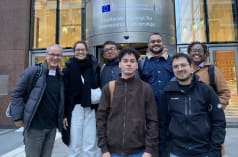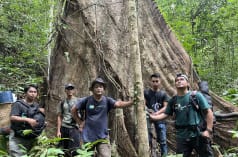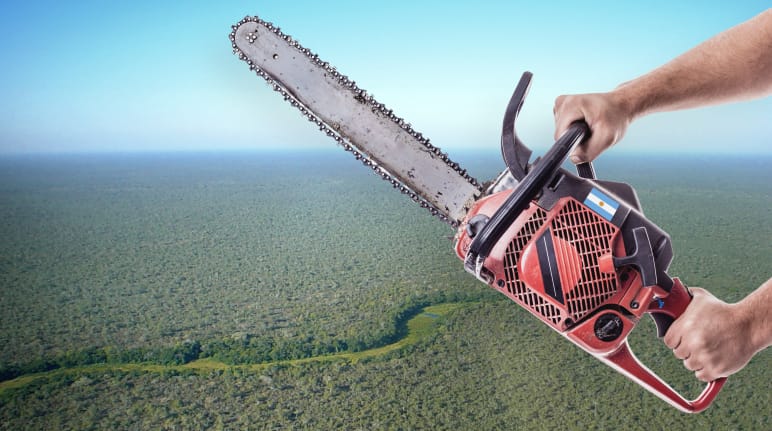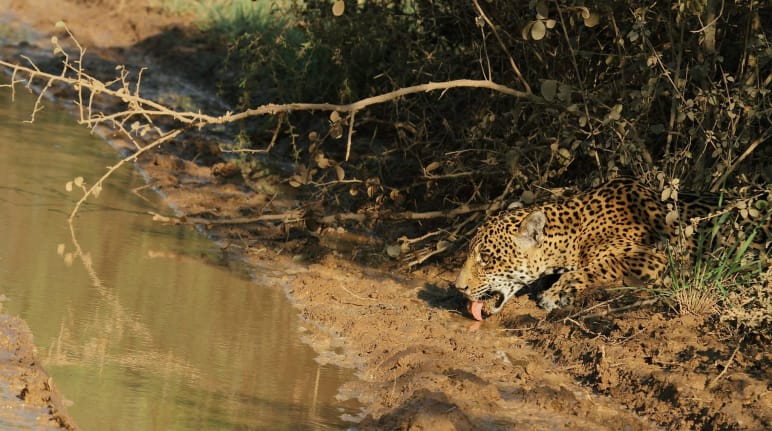Argentina: Stop the Chaco forest chainsaw massacre!
During his election campaign, Argentina’s President Milei brandished a chainsaw to symbolize his plans to cut the state down to size. Now the legislature of Chaco province has taken Milei’s chainsaw message literally, passing a law that removes protection for hundreds of thousands of hectares of Chaco forest.
Call to actionTo: the government of the province of Chaco; the Argentinian Supreme Court
“The Chaco in Argentina, one of the most threatened forest areas in the world, must be protected.”
The biodiverse dry forests of the Chaco are the second largest forest area in South America after the Amazon. The ecoregion stretches from northern Argentina to neighboring Bolivia, Brazil and Paraguay.
But the Chaco is under severe threat: vast areas of forest are being cleared for soy monocultures, cattle ranching, charcoal and tanning agents.
In a late-night vote, legislators in the Argentinian province of Chaco have now rolled back the protection of large parts of the Chaco forest, legalizing the deforestation of hundreds of thousands of hectares.
To this end, an irregular procedure was used to modify the map of the Territorial Regulation of Forests (OTBN) and the protected areas established therein under the Argentinian Forestry Code, including important migratory corridors for wild animals such as the jaguar.
The legislators also deliberately ignored the mandatory participation of the Indigenous peoples living there. This will further marginalize and impoverish them.
The decision is in line with the policies of Argentinian President Milei, who wants to open up natural resources for economic exploitation and sell them to the highest bidder. Milei considers environmental protection largely unnecessary and denies man-made climate change.
Furthermore, his government views the Indigenous peoples’ demands for respect for their land and human rights as an “attack on sovereignty”, as Vice President Victoria Villarruel declared during the election campaign – demonstrating her profound ignorance.
Please sign our petition to protect the Chaco forest in Argentina.
Start of petition: 28/06/2024
BackgroundIn Argentina, more than eight million hectares of forest – an area the size of the Czech Republic – have been cleared since the cultivation of genetically modified soy was approved in 1996, In the province of Chaco, 859,503 hectares – roughly the size of Cyprus – of virgin forest were cleared during the same period, including 57,000 hectares in the last year alone. During this period, more than a quarter of the forest cover in the entire Argentinian Chaco has been destroyed.
Legal action
To prevent the legislative rollback, Greenpeace Argentina has requested an injunction from the country’s Supreme Court as part of a pending lawsuit. The organization has had a lawsuit for the protection of the jaguar pending there since 2019. The jaguar, whose population is classified as “critically endangered”, has just over a dozen individuals left in Argentina. The provinces of Chaco, Formosa, Salta and Santiago del Estero, as well as the national government, are allowing the destruction of the jaguar’s habitat, in violation of the Forest Code.
Milei government undermines protection of the environment, climate, minorities and Indigenous peoples
President Milei’s government is attemptiing to repeal a series of hard-won regulations en bloc: It wants to repeal the Agrarian Law and the Forestry Law, has dissolved the Special Commission on Indigenous Peoples of the Upper House, has announced the dissolution of the National Institute for Indigenous Affairs (INAI) and the closure of the National Institute against Discrimination, Xenophobia and Racism (INADI).
To: the government of the province of Chaco; the Argentinian Supreme Court
Ladies and Gentlemen,
While laws to protect forests and ecosystems are being strengthened around the world, your government is doing the opposite.
The new forest legislation of the Chaco “allows the deforestation of areas currently classified as category II – yellow, converting them to category III – green, which is prohibited by national legislation,” according to Greenpeace Argentina. The organization thus criticizes the injustice you are committing by allowing hundreds of thousands of hectares of virgin forest to be cleared.
We call on you to immediately stop the rollback of the regulations protecting the Chaco, which would allow the destruction of the natural habitat and violate the provisions of the national law on native forests.
The severe climate and biodiversity crises urgently require an end to all deforestation and the promotion of sustainable forest management and restoration, while respecting the rights and territories of Indigenous and peasant communities and protecting biodiversity.
The catastrophic floods devastating the Brazilian state of Rio Grande do Sul show the consequences of failing to protect ecosystems.
At the Glasgow Climate Summit in 2022 (COP26), Argentina committed to halting deforestation by 2030. Policies and laws must move in this direction – not the opposite.
On behalf of the jaguar, a large mammal nearly extinct in Argentina due to habitat loss, and all the species that inhabit the Chaco, we ask you to protect the forests of the Chaco in Argentina. The Chaco, one of the most threatened forest areas in the world, must be protected.
Yours faithfully,
The issue – our appetite for meat
Most people in rich countries consider meat to be essential to a good meal. That holds especially true for Americans, who each consumed 90 kilograms of meat in 2014 – in the same year, the global average was 34 kilograms. There are 19 billion chickens, 1.4 billion cows, 1 billion pigs and 1 billion sheep on the planet at any given time – that’s three head of livestock for every person.
Maintaining such a huge livestock population has a very high price: 26 percent of the world’s ice-free land is used for livestock grazing and 33 percent of the world’s cropland is dedicated to growing livestock feed. Instead of feeding humans, a significant share of the world’s wheat, corn, barley and soybeans is thus used to raise livestock. Soybean meal is the largest source of protein animal feed in the world, and the areas needed for its production are expanding into fragile ecosystems such as the Brazilian Cerrado and the Amazon.
The impact – deforestation, monocultures, climate change
Landscapes once covered by rainforest and savannah are now marked by endless industrial agriculture spaces. More than 75 million hectares are devoted to growing soy – an area three times the size of the United Kingdom. Indigenous people are frequently displaced when their forests are bulldozed or torched, and those that remain are often in grave danger due to pesticide exposure: Roundup-Ready Monsanto GMO soybean plants are grown on 31 to 38 percent of the total planted area in Brazil, Argentina, Paraguay and Uruguay. The active ingredient in Roundup is glyphosate, an herbicide that is suspected of causing cancer and damaging human DNA.
Producing meat has a profound impact on the climate: with methane from bovine stomachs, carbon released by deforestation and fossil-fueled machinery, and nitrous oxide released by synthetic fertilizer, animal agriculture accounts for 18 percent of the world’s greenhouse gas emissions.
The solution – plant power and planned indulgences
Our food choices have a direct impact on the future of the rainforests: the animal products we eat account for 72 percent of all food-related greenhouse gas emissions. Their production also requires many times more farmland than plant products for human consumption.
Here is how you can help protect your health, the environment and the climate:
- Eat alternatives to meat and dairy products: Seitan steaks, lupin spreads, soy milk and other tasty and nutritious alternatives to animal products can be found in virtually any supermarket.
- If you must eat meat, make it an occasional treat: If you are not ready to give up meat entirely, reduce your consumption as much as possible and make meat a planned indulgence. Choosing organic meat can help further reduce the environmental impact of your diet.
- Say yes to soy products: Only about two percent of the world's soy crop is processed into tofu, soy yogurt and similar products. Soy for human consumption is mostly grown in Europe and does not drive deforestation.
- Stop food waste: Consumers in North America and Europe each waste between 95 and 110 kg of food a year – much of it meat. Planning your grocery shopping with care can literally save lives.
- Speak out: Tens of thousands have taken part in street protests such as the March Against Monsanto to pressure policymakers and advocate forms of agriculture that take human health, animal welfare and climate protection into account. Taking part in online petitions and writing to your elected representatives can also make a real difference.
late-night voteWhile Argentina’s attention was focused on the debate in the National Congress in the capital, Buenos Aires, on the comprehensive legislative package (Ley de Bases) of the government of President Javier Milei, the parliament in the province of Chaco passed the new Law on Territorial Management of Native Forests (OTBN) at 2:30 am on April 30, 2024.
rolled backThis has implications for the conservation and buffer corridors of Copo National Park, La Pirámide Reserve and Loro Hablador Provincial Reserve.
This petition is also available in the following languages:
Help us reach 100,000:












